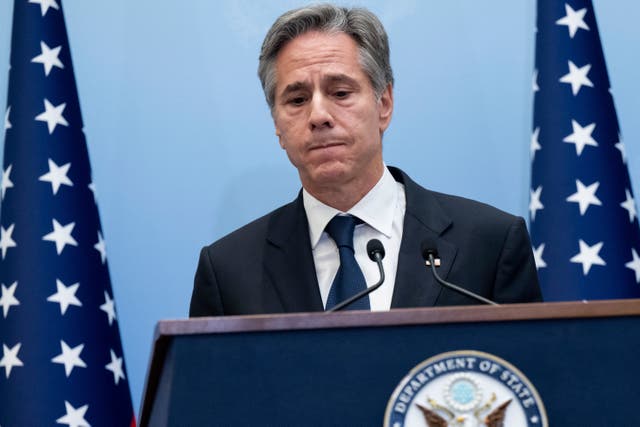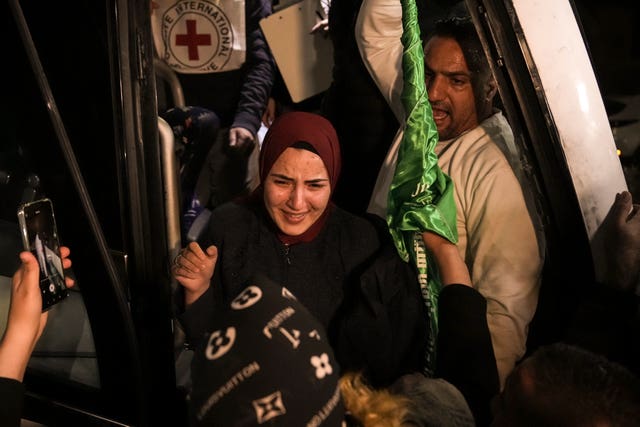
Clive Bull 1am - 4am
1 December 2023, 09:04

Israel dropped leaflets over parts of southern Gaza urging people to leave their homes, suggesting it was preparing to widen its offensive.
Israeli fighter jets have hit targets in the Gaza Strip minutes after a week-long truce expired as the war with Hamas resumed in full force.
Black smoke billowed from the besieged territory and Israel dropped leaflets over parts of southern Gaza urging people to leave their homes, suggesting it was preparing to widen its offensive.
Renewed hostilities heightened concerns for about 140 hostages who remain in Gaza, after more than 100 were freed as part of the truce.
Mediator Qatar said that efforts are continuing to renew the truce and expressed “deep regret” over the resumption of Israeli bombardments.
Israel and Hamas have traded blame, with each saying the other side violated the terms of the truce. Qatar, which has served as a mediator along with Egypt, appeared to single out Israel’s role in the resumption of violence.
Qatar’s Foreign Ministry said that “the continued bombing of the Gaza Strip in the first hours after the end of the pause complicates mediation efforts and exacerbates the humanitarian catastrophe” in the territory. It urged the international community to “move quickly to stop the violence”.
The collapse of the ceasefire came a day after US Secretary of State Antony Blinken met Israeli officials and urged them to do more to protect Palestinian civilians as they seek to destroy Hamas.

Mr Blinken was on his way on Friday to the Cop28 climate talks in Dubai, where he will meet Arab and other leaders.
It was not clear to what extent Israeli Prime Minister Benjamin Netanyahu will heed the appeals of the United States, Israel’s most important ally.
Mr Netanyahu’s office said on Friday that Israel “is committed to achieving the goals of the war – releasing the hostages, eliminating Hamas and ensuring that Gaza never again constitutes a threat to the residents of Israel”.
In the leaflets it dropped in southern Gaza, Israel urged people to leave homes east of the city of Khan Younis. The leaflets also warned that Khan Younis was now a “dangerous battle zone”.
Hundreds of thousands of people fled northern Gaza earlier in the war, with many taking shelter in Khan Younis and other places in the south.
One of the first air strikes on Friday destroyed a large building in Khan Younis. Moments later, residents were seen frantically searching the rubble for survivors as medics approached. One wounded person was carried away on a stretcher.
Hamas violated the operational pause, and in addition, fired toward Israeli territory.
The IDF has resumed combat against the Hamas terrorist organization in Gaza. pic.twitter.com/gVRpctD79R
— Israel Defense Forces (@IDF) December 1, 2023
In Hamad City, a Qatari-funded housing development near the city, a strike hit an apartment in a multi-storey residential building while other parts of the building appeared largely intact.
In the refugee camp of Maghazi, rescuers clawed through the rubble of a large building hit by warplanes.
Only hours in to the renewed offensive, the Health Ministry of Hamas-controlled Gaza said 32 people had been killed and dozens wounded.
Israel has said it is targeting Hamas operatives and blames civilian casualties on Hamas, accusing the militants of operating in residential neighbourhoods.
Since the war erupted on October 7, in response to a deadly Hamas attack on southern Israel, many of those killed in Israeli bombardments have been women and children.
In Israel, sirens warning of incoming rockets blared at several communal farms near Gaza, a sign that Hamas also resumed attacks, but there were not reports of hits or damage.
Mr Netanyahu said the war resumed because Hamas had violated the terms of the truce. “It has not met its obligation to release all of the women hostages today and has launched rockets at Israeli citizens,” he said.
The Israeli military’s announcement of the resumption of strikes came only 30 minutes after the ceasefire expired at 7am (0500 GMT) on Friday.
The halt in fighting began on November 24. It initially lasted for four days, and then was extended for several days with the help of Qatar and fellow mediator Egypt.
During the week-long truce, Hamas and other militants in Gaza released more than 100 hostages, most of them Israelis, in return for 240 Palestinians freed from prisons in Israel.

Virtually all of those freed were women and children but the fact that few such hostages remained in Gaza made it hard to reach a deal to extend the ceasefire.
Hamas, a militant group that has ruled Gaza for 16 years, had been expected to set a higher price for the remaining hostages, especially Israeli soldiers.
It was not immediately clear whether negotiators were continuing efforts for another temporary ceasefire. Qatar and Egypt, which have played a key role as mediators had sought to prolong the truce by another two days.